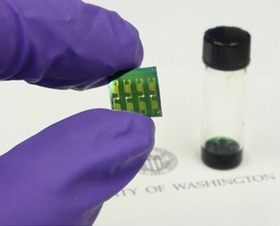The future of computing lies in organic molecules?
TipsMake.com - Some of us may say that our computers have a personality, but we all know that computers don't really 'live'. However, future computing devices may have real organic ingredients.
 Efforts to develop the future of computing include from photonic-based computing to spintronic, or even harnessing, battery processors. Now, a group of researchers from the US and Japan have designed a computer that is like a normal computer from organic molecules. In the next few years, processors will probably become more organic, not just machines.
Efforts to develop the future of computing include from photonic-based computing to spintronic, or even harnessing, battery processors. Now, a group of researchers from the US and Japan have designed a computer that is like a normal computer from organic molecules. In the next few years, processors will probably become more organic, not just machines.
The goal of researchers is to design a computer processor that can solve problems that use hardware more than complex software, because using the software can take a long time. more time. To get closer to the goal, they will have to work hard to mimic the way the human brain works.
A brain that contains billions of neurons, is connected all together and works in a complex network to solve problems, often in tandem rather than just solving one problem. at. The human brain is also capable of learning what is already in memory, which is missing from all computer processors. Through the development of biological processors, computers can handle complex problems faster thanks to the knowledge learned (in memory) and can solve problems faster thanks to the benefits. Increased benefits from computing act like the human brain.
To design the processor, the researchers introduced two classes of 2, 3-dichloro-5, 6-dicyano-p-benzoquinone, commonly known as DDQ, on a gold interface. The team then also used a microscope to encode information into layers of organic matter through the transfer of electronic circuits. This will create electronic circuits between molecules. The research team will then test its original computer through successful "imitation" of phenomena in nature.
The team also hopes to create a computer that works like a human brain and will be able to solve a variety of problems like the human brain, but will use algae. Because silicon-based processors will be relatively small (up to 11nanometer maximum), firms like Intel, AMD and IBM will have to pay more attention to bio-computing.